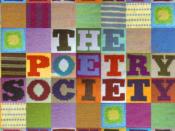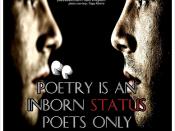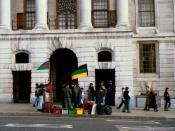The title of the poem, ÃÂthe words that rise to the surfaceÃÂ, is indicative not only of the sentiment of anti-apartheid people living in South Africa but the manner in which the emotions and feelings of these people manifested themselves. Slowly, with the imagined metaphor of bubbles that start in a kettle ÃÂ slow and steady at first with furious energy as both the poem and water reach boiling point. The context of the poem sheds light on the intention of the author ÃÂ written in 1985 when the apartheid regime was at itsÃÂ most oppressive due to the growing resistance amongst the black population of South Africa. The poem in itsÃÂ course challenges the conventional forms of poetry with the grammar, metre and rhyme to construct a novel postcolonial piece of literature in which Karen Press is able to convey the emotions and feelings of a subjugated people.
In the first instance, one can clearly notice that Karen Press is breaking convention predominantly with the lack of casing and minimal punctuation.
We as the reader are taken out of our comfort zone by being stripped of the norms or guardrails (grammar/pause-punctuation) that make verse easily accessible, with the poemÃÂs intention being to reflect the social, political and economic climate of South Africa sliding and gliding into anarchy. Press uses enjambment (where one line is carried on to the next without pause) throughout the poem to increase the speed, excitement and suspense for the following line; at the same time one should use each line break as a natural pause regardless of the lack of punctuation. The title and opening line of the poem illustrates the effect that alliteration has on the poem; it is in the ÃÂtÃÂ sound that the author establishes a rhyme. The alliteration and the stressed consonants become replacements for punctuation; this is carried throughout the poem and is deliberate in its attempt to distance itself from colonial influences ÃÂ ÃÂanger blood grief vengeanceÃÂ . The words placed in each line are done so in order to create small sentences, with the end of each line acting as either punctuation or a conjunction. This literary technique creates complexity for the reader where normally there would be none. Opening with ÃÂthe words that rise to the surfaceÃÂ , the reader is imagining all the possible grievances the black people of South Africa are wanting to voice. The first line of the poem, with enjambment, moves into ÃÂnow are burnt bodiesÃÂ and immediately one thinks that the ÃÂburnt bodiesÃÂ are two of the surfacing words. However, on closer inspection the poet asks if the words are not burnt bodies in themselves that float lazily to the surface as and could the author be challenging us to question the futility of even voicing our beliefs in an authoritarian state like that of the Apartheid regime? The author is not expecting you to subscribe to this notion but it is put forward in order to highlight the difficulty of such a proposition. The theme of movement is carried from the second line to the third, ÃÂwrithing stones bullets petrol bombsÃÂ , in using the word ÃÂwrithingÃÂ the author translates a rather grotesque image of live people being set ablaze as there is no punctuation to slow the reader after ÃÂburnt bodiesÃÂ. The word ÃÂwrithingÃÂ also gives animation to the words that follow, ÃÂstones bullets petrol bombsÃÂ are all motion based in the context of the line. The stanza moves forward picking up to a frenzied pace where almost out of breath the author pleads for ÃÂorderÃÂ. Many popular terms and actions of the worrying and ominous state of affairs in the South Africa of 1985 are used for dramatic effect; ÃÂdeath squadsÃÂ , ÃÂemergency lawÃÂ and ÃÂbalaclavasÃÂ .
The second stanza of the poem is short and developed to convey the point the author is attempting to put across. The newspapers document all these atrocities in their articles and the police using the same words document them in their files. The newspapers and the police both apply grammar to such horrific acts and in many ways trivialise them as just another article or file and the event or action becomes redundant. The meaning and true essence of the movement and freedom cause are lost under the ÃÂstate of emergencyà, the raw zeal and passion of the people is stripped. The meaning behind the of the lack of punctuation in the first stanza is clarified by stanza two àno words used in the first stanza are in need of a context, they occurred daily in 1985 and the atrocious nature of them should have called for an immediate end. The ÃÂfree-pressàwere in their complacency over the subjugation occurring in South Africa were equally as guilty as the police of racism. Karen Press uses a comma in the middle of line 10, dividing the stanza into two complex sentences and the line breaks at the end of lines 1&2 providing replacements for conjunctions in linking the simple sentences. The pause also slows the reading pace down which in turn allows, ÃÂunder the state of emergencyâÂÂthe two are combining forcesà, to be read in an accusatory and sorrowful tone as an expression of disappointment.
The word ÃÂgrammarÃÂ is used as a metaphor for actions of varied nature; the newspapers and their writings, the policeÃÂs atrocities and the black plight in the third stanza. The move from passive to militant mass demonstration of the 1980ÃÂs black resistance is echoed in the poem where the peoples ÃÂgrammarÃÂ is said to have ÃÂshiftedÃÂ from ÃÂpassive to active voiceÃÂ . During this period a metaphorical boiling point had been reached in which there were very few words on the lips of the people, ÃÂbut there are very few words at the surfaceÃÂ . One can only contemplate over what words are at the surface now but one can hazard a guess at words like freedom and democracy. The author is not concerned with all the surface words as these are merely words concocted by a corrupt regime and if the reader is eager to explore the true plight of these people they must explore the roots and emotions that lie ÃÂbelowÃÂ . Suspense is employed in lines 15 and 16 before the author divulges the very ÃÂfewÃÂ words that could encapsulate the emotions of black South Africans, the motives for resistance in the first instance. Each word of line 17 must be read with the feeling that that word invokes and each emotion allowed to pulsate through your body. ÃÂangerÃÂ to an inhumane ruling race, ÃÂbloodÃÂ for all the men and woman who spilt it for the cause or as a result thereof, ÃÂgriefÃÂ in the face of all that has been lost and ÃÂvengeanceÃÂ to be expropriated on those responsible.
ÃÂat the bottom,àof all this strife we find only ÃÂsilenceàand it is the ÃÂburnt out silenceàthat comes after prolonged shouting or in this context resisting. The people left hopeless and oppressed have had their ÃÂsoulÃÂ(s) ÃÂguttedàby the circumstances in which black South Africans of the 1980ÃÂs found themselves. The poem closes with the author scolding society for expecting anything creative to come forth from such a deplorable situation. The metaphor of ÃÂwordsàthat ÃÂgerminateàor form from others is fitting as one can literally not speak after all the events of Apartheid. There is certainly no hope for the idea of life that ÃÂgerminateàinvokesàâÂÂBibliography:ÃÂPress, K. 1990. the words that rise to the surface. Cape Town. Buchu Books





